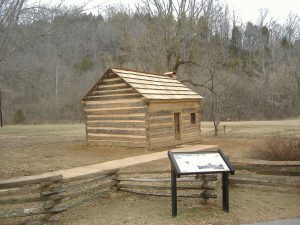Abraham Lincoln’s father moved his family from their first farm because of land disputes, and they resettled in Knob Creek, Larue County, Kentucky in 1811. Knob Creek was Lincoln’s boyhood home. When they arrived at Knob Creek, he was two years old, and his sister Sarah was four. Their sibling, Thomas, was born a year after they moved in. The Lincoln family stayed there until Lincoln was eight years old. Their time there was occupied with farming 30 acres of land. A creek ran through low-lying land surrounded by hills that looked like knobs.
In a letter dated 1860, Lincoln spoke about his boyhood home, saying that although he was not born there, he remembered it too well. He had genuine reasons to say that he recalled Knob Creek very well. It was the place that shaped his character and sensibilities. It was where his mother read to him stories from the Bible in the flickering light of oil lamps. It was the place he felt great pain when his baby brother died.
Knob Creek farm also gave Lincoln happy memories. Its rich land allowed him and his sister Sarah to plant in their garden. According to Lincoln, he sowed pumpkin seeds in alternate hills, and his sister planted corn. Then a heavy rain fell the following night, and water flowed from the hills. The creek overflowed and washed away what he and his sister planted.
Lincoln had fond memories of the schools he and his sister Sarah went to. He said that these were “blab” schools because the teachers there did not have anything to write the lesson with, and so they simply ordered the children to speak aloud the lesson. These schools were only log cabins with one room, where the children were taught basic things like numbers, letters, and social manners. Lincoln spent less than a year in these schools, but that short period of time was enough to awaken in him a love for reading and writing that eventually shaped a young nation.
The future president of the United States had an accident on Knob Creek that probably impressed him with a genuine desire to help his fellowmen. While playing on a log used as a footbridge, he fell into the overflowing Knob Creek. A friend of his, Austin Gollaher, rushed to help him. Gollaher picked up a long tree branch lying nearby and extended it towards Lincoln. After he assumed the presidency, Lincoln spoke fondly of the accident and his friend.
Knob Creek molded in Lincoln the morality of hard work. As a young boy, he had become used to demanding physical work at the farm. His distaste for unpaid work and the evils of slavery may have first been sparked here. At Knob Creek, Lincoln saw African-Americans being transported to the south to be sold.
In 1816, the Lincoln family left Knob Creek and moved to Indiana. This was the end of a young boy’s experiences on the farm and the beginning of his influence on American history.
The National Park Service took over the farm in 2001 from private ownership, and today, the Knob Creek grounds are open to visitors every day from sunrise to sunset.
